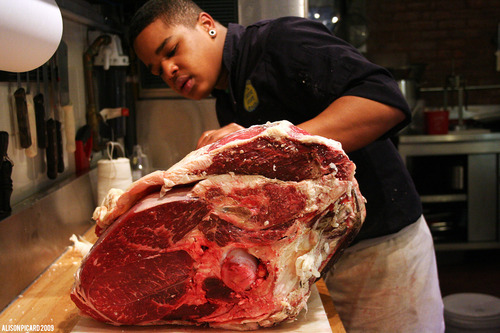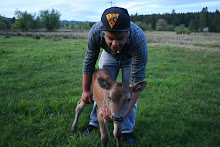I have been saying for months that I would write a longer post focusing on heritage breeds. I admit I've been putting it off, the only reason being that it's such a big and important topic that I am concerned I will leave elements out. However, with my heritage bacon project having recently been successfully funded and the upcoming first Heritage Breed Supper Club close to selling out, I realize now is the time. I have to remind myself this is not a one-shot deal, I don't have to explain it all in one post. Keeping that in mind, I am finally able to sit down and do this.
We must begin by understanding what a heritage breed is and why they are threatened. Heritage breeds are the livestock version of heirloom varieties in produce. These are the foods our ancestors raised and ate until the introduction of and conversion to industrial farming methods. These are the breeds that took generation after generation of selective breeding to come into
existence. Some were bred to withstand certain climates or geography, some for different qualities in their meat, some for milk production, some for their appearance, etc. While it did take humans to create these breeds, they were not at all like the scientifically manufactured breeds the meat industry relies on now. They ate a natural diet, whether that meant grass or kitchen scraps or bugs and worms. They produced few young and grew slowly. The meat and other products from these animals usually stayed nearby, bartered with neighbors and sold in the town market. Every one of these traits is anathema to industrial farming. As production sped up, it was quickly apparent that these breeds were not suited to the demand of the new market. Of course farmers are people, people who had families to support. The market had changed and it was only a matter of time before many would stop breeding heritage animals and concentrate on homogenizing breeds for speed of growth and life on the feedlot.
This threat of extinction is difficult for many to grasp, if they are even aware of it at all. This is because these breeds are in danger not because of pollution, climate change, habitat loss or disease. These breeds are threatened simply because there is no market for them. We must keep in mind we are talking about domesticated animals. This is where animal husbandry comes in. Most domestic animals require some amount of help from humans to procreate. But until very recently, there wasn't much reason for a farmer to choose to breed say, Tamworth pigs over the common industrial White pig. A working farm is a business, not a wildlife refuge. Raising animals takes tons of dedication, year-round work at all hours of the day and significant financial investment. Farmers raise what they can sell.
This introduces the movement and concept called "Conservation by Consumption". By purchasing heritage breeds meats we directly influence and support the farmers who are striking out on their own, rejecting the industrial model and taking the risk that no one will buy the fruits of their labor. This is why I exclusively use heritage breed meat. The return of heritage breeds is a major component to the sustainable meat equation. There are so many reasons for this.
Every farm that is raising and selling heritage meats is one more that IS NOT a disgusting feedlot. As I stated earlier, the needs of these breeds make factory farming a non-option. They basically demand a farmer to revert to old methods, seasonality and bio-diversity. All of this requires respect, attentiveness and a connection to the earth and its cycles from the farmer. By raising far fewer animals, the problem of pollution from the waste products are greatly reduced. A natural diet lessens pressure to produce the corn and soy used in commercial feed, and therefore also lessens the amount of fossil fuels needed to transport these foods. All that waste only results in diseased animals.
* Because heritage breeds eat good food, are given space to live their lives the way nature intended, and allowed to form familial bonds and have farmers deeply committed to their health, I can only imagine these animals are much happier than their industrial counterparts. At this point, most heritage breeds are raised on very small farms and so often become local products by default. Supporting these local farms bolsters local economies. It's like killing 10 birds with one stone. On a purely visceral level, it is not even worth comparing the flavor and texture of heritage breed meat to that of industrial breeds.
Currently, many heritage breeds are only available on a very limited basis, if at all. So I'd like to name a few for you to look for in your area, as well as great resources to keep up with new farmers making the switch to this more sustainable method of farming.
Pork: The main industrial breed is the White pig. Its gene pool is often supplemented by the two most commercially successful heritage breeds, the Duroc and Berkshire pig. The Tamworth, Gloucester Old Spot, Large Black, Yorkshire, Red Wattle, Choctaw, Guinea Hog,
Mulefoot,
Ossabaw Island and Hereford round out the rest of the heritage breeds.
Beef: There are nearly 20 breeds of heritage cattle breeds, but due to the varying climates and geography of habitats where cattle are farmed, many of these have been unintentionally preserved by the meat industry.The beef industry is one that had capitalized on specialized breeds despite using industrial methods. Breeds like Angus and Hereford are examples of this. Unfortunately the dairy industry did not do the same, it has relied almost solely on the Holstein for years, though the Jersey and Brown Swiss have benefited from recent demand for milk from grazed cows. Some other breeds are the Ayrshire, Guernsey,
Galway and Milking Devon.
Lamb: There are over 20 heritage breeds of Lamb. As there are several very different uses for lamb: wool, meat and milk, so there are several breeds that have been relied upon and thus preserved. Also the fact that Americans don't eat much lamb compared to other red meats has helped as well. The Tunis,
Katahdin, Navajo-
Churro, Santa Cruz and St.
Croix are just a few of the breeds you may be able to find.
Chicken: Like pigs, the main industrial breed is simply known as the White chicken. It's funny that one breed is so ubiquitous when there are over 50 heritage breeds to choose from! Sadly, almost half of those are listed as "critical" or "threatened" by the American Livestock Breeds Conservancy, the organization that tracks the numbers of heritage breeds in this country. While many families are not eating them, the trend of backyard chickens is doing a lot to help some of these breeds. The Delaware, Sussex, Buckeye and Jersey Giant are just a few.
There are heritage breeds of every livestock animal; geese, rabbit, duck, turkey, horses, goats and donkeys. They all need our help to recover population numbers before they are extinct.
Some informative sites about heritage breeds:
American Livestock Breed Conservancy-
http://albc-usa.org/- Information about heritage breeds in U.S. specifically, non-profit membership organisation working to advocate for preservation of heritage breeds.
Local Harvest-
http://www.localharvest.org/- Information about farms raising heritage breeds, one can search by animal or location and get a list of farms to contact for products.
Heritage Foods USA-
http://www.heritagefoodsusa.com/index.html- Much like Local Harvest site, though it also works to connect chefs and other industry professionals to farmers. Offers online shopping as well.
*Be aware that USDA-Organic certification requires animals be given "organic" feed. No government official certifies bugs and worms, the natural diet of chickens, or grasses for cattle, or kitchen slop for piggies, as organic. In the case of meat, "USDA-Organic" equals "Feed manufactured and controlled by humans", this is why you are not likely to ever see me selling it.







